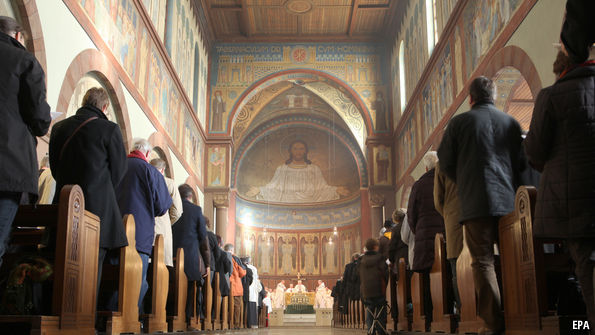這篇的摘要,18日臨睡前在FB一讀,莞爾。19日醒來忘了,過幾小時才記起來,找來一貼。
Forgive me father
Reimagining Europe as a drama between priest, sinner and infidel

PLENTY of people have tried to use Christian imagery to portray or even explain the multiple strains suffered by the European Union and its monetary system. For example, Emmanuel Macron, France’s economy minister, once suggested that the Catholic (and Orthodox) belief in a sacrament of forgiveness helped to explain the happy-go-lucky attitude of the European south to profligacy and debt which the Protestant north found so exasperating. And Stuart Holland, a British Labour politician, is among several commentators who have found significance in the fact that the German word Schuld means both debt and guilt in the moral or religious sense.
A more playful deployment of Christian imagery has been proposed by one of the leading academic scholars of EU affairs, who happens to be Greek. After lecturing for many years at Oxford University and becoming a professor at the London School of Economics, Loukas Tsoukalis now lives in his homeland and runs a foreign-affairs think-tank, ELIAMEP. For his sins, or perhaps for his virtues, he has been an adviser to past presidents of the European Commission and the European Council.
In a book about the European crisis, entitled “In Defence of Europe” and published this summer, Mr Tsoukalis calls one chapter “The Priest, the Sinner and the Non-Believer”. The priest is Germany, the sinner is Greece, and the incorrigible free-thinker is Britain. The book went to press fractionally before the Brexit vote so the characterisation of Britain might now need to be sharpened up: the church’s most sceptical member is not merely shuffling in the pews or refusing to sing hymns, but actually heading for the ancient oak door, as behoves a full-blown apostate. One way or another, the sceptic’s departure will affect relations between the German priest and the Greek sinner; the priest will either become slightly more lenient (as Mr Tsoukalis predicts) or perhaps even stricter.
So how illuminating is it to use religious language to understand the morally and historically charged relationship between Teutons and Hellenes? Or to put it in more personal terms, the permament standoff between say, Wolfgang Schäuble, Germany’s finance minister and guardian of monetary rectitude, and Alexis Tsipras, the Greek prime minister whose schoolboy grin charms some listeners into overlooking his transgressions and makes others even angrier? How well does the analogy between father confessor and penitent wrongdoer work?
It’s certainly true that in Germany’s handling of the Greek debt crisis, there have been elements of moral rebuke, and demands for exemplary atonement, coupled with an insistence that the sinner must be offered a path to redemption, be it ever so long and painful. Excommunication is held in reserve as the very last resort. And there is a whiff of old-fashioned Catholic or Protestant theology in the German insistence that debts cannot simply be written off, however much leeway may be allowed over the timetable for redemption.
But as Mr Tsoukalis explains, part of the purpose of the priest-sinner analogy is to make a broad point about the euro crisis: in adopting such a sacerdotal stance, Mr Schäuble is unhelpfully implying that every single drop of the responsibility for the financial crisis lies with the debtors. “One thing he has hardly ever recognised is that when a big financial bubble bursts, creditors should bear part of the blame and share the burden of adjustment.” Whether or not you accept that view, it suggests a narrower point on which a lot of people would concur. Even if you acknowedge that most of the blame for the euro crisis lies with profligate borrowers, it doesn’t help to rub the point in by moralising about it. At least psychologically, there is a better chance of solving the crisis if people discuss it as though it were a common problem in whose resolution everybody had an interest.
There is also a more subtle cultural and theological point which might be made in response to Mr Tsoukalis’s schema. The priest-sinner analogy is probably intended to conjure up a fierce Catholic cleric of the Jansenist school, doling out scoldings and penances to a terrified miscreant. But in Greek spiritual writings, and indeed in Dostoyevsky, you will come across a gentler image of a confessor: one who is personally humble and conscious of his own sins, and emphathises so deeply with his spiritual children that he weeps for them, not in anger but in compassion. If the moral masters of the European north were a bit more like that, then the southern transgressors might be more inspired to mend their ways.
沒有留言:
張貼留言